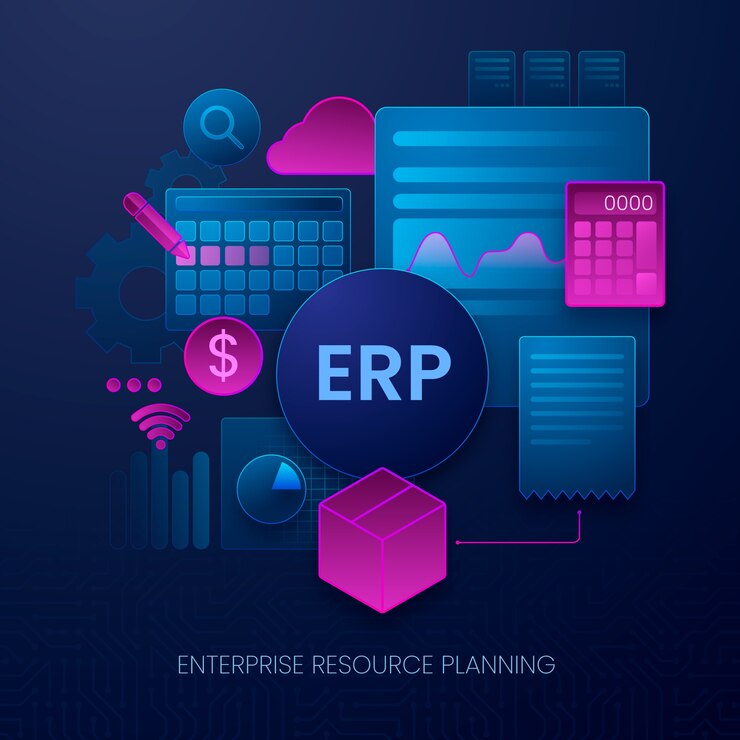Introduction to ERP Systems
In today’s rapidly evolving business landscape, ERP systems have become the backbone of organizational efficiency. These integrated solutions are transforming how companies operate across the UAE, from Dubai’s bustling trade hubs to Abu Dhabi’s corporate powerhouses. This comprehensive guide explores everything you need to know about ERP system in UAE implementations, featuring real-world ERP system examples to help you make informed decisions for your business.
What is an ERP System?
An Enterprise Resource Planning (ERP) system is a unified software platform that connects all core business functions into a single, cohesive system. These powerful solutions integrate:
Key Business Functions Covered by ERP
- Financial Management: Accounting, budgeting, and reporting
- Supply Chain Operations: Procurement, inventory, and logistics
- Human Capital Management: Payroll, benefits, and talent management
- Customer Relationship Management: Sales, marketing, and service
- Business Intelligence: Analytics and decision support tools
Why UAE Businesses Need Specialized ERP Systems
The UAE’s unique business environment demands ERP system in UAE solutions that address local requirements:
Critical Features for UAE Organizations
✔ VAT Compliance Tools: Automated tax calculations and reporting
✔ Multi-Currency Support: Handling AED and international transactions
✔ Arabic/English Interfaces: Bilingual capabilities for diverse workforces
✔ WPS Integration: Compliance with UAE’s Wage Protection System
✔ Local Data Hosting: Meeting UAE data sovereignty regulations
Top ERP System Examples Transforming UAE Businesses
Here are five leading ERP system examples making waves in the UAE market:
1. SAP S/4HANA (Best for Large Enterprises)
- Key Feature: AI-powered analytics
- UAE Advantage: Dubai government-approved solution
- Ideal For: Multinational corporations with complex operations
2. Oracle NetSuite (Top Cloud ERP)
- Key Feature: End-to-end business visibility
- UAE Advantage: Pre-configured VAT compliance
- Ideal For: Fast-growing mid-market companies
3. Microsoft Dynamics 365 (Best Hybrid Solution)
- Key Feature: Seamless Office 365 integration
- UAE Advantage: Strong local partner network
- Ideal For: Businesses wanting Microsoft ecosystem synergy
4. Odoo (Most Flexible for SMEs)
- Key Feature: Modular, affordable pricing
- UAE Advantage: Arabic language support
- Ideal For: Startups and small businesses
5. Zoho ERP (Best All-in-One Suite)
- Key Feature: Integrated CRM and productivity tools
- UAE Advantage: Local data centers
- Ideal For: Tech-savvy small businesses
Implementing an ERP System in UAE: Step-by-Step Guide
Phase 1: Preparation (4-6 Weeks)
- Conduct business process mapping
- Identify pain points and improvement areas
- Set measurable implementation goals
Phase 2: Selection (3-4 Weeks)
- Evaluate vendor demonstrations
- Check UAE-specific compliance features
- Assess total cost of ownership
Phase 3: Deployment (8-12 Weeks)
- Data migration and system configuration
- User acceptance testing
- Department-specific training
Phase 4: Optimization (Ongoing)
- Performance monitoring
- Advanced feature rollout
- Continuous improvement initiatives
Future Trends in ERP Technology
The ERP system landscape continues to evolve with exciting developments:
1. AI and Machine Learning Integration
- Predictive inventory management
- Intelligent fraud detection
- Automated financial forecasting
2. Blockchain-Enabled ERP
- Smart contract automation
- Tamper-proof audit trails
- Enhanced supply chain transparency
3. IoT-Connected Systems
- Real-time asset monitoring
- Predictive maintenance alerts
- Smart warehouse management
4. Voice-Activated ERP
- Hands-free data queries
- Voice-to-report generation
- Virtual assistant support
Conclusion: Transforming Your Business with ERP
Implementing the right ERP system in UAE delivers measurable benefits:
- 40-60% improvement in operational efficiency
- 30-50% reduction in administrative costs
- 100% compliance with UAE regulations
- Real-time visibility across all business functions
Whether you’re a startup or established enterprise, these ERP system examples demonstrate how modern solutions can revolutionize your operations while ensuring compliance with UAE’s dynamic business environment.
FAQs About ERP Systems in UAE
1. What’s the average implementation cost for ERP in UAE?
Costs range from AED 50,000 for SME solutions to AED 500,000+ for enterprise implementations.
2. How long does ERP implementation typically take?
Most projects require 3-9 months depending on business size and complexity.
3. Can ERP systems handle UAE VAT compliance?
Yes, top solutions automatically calculate VAT and generate FTA-compliant reports.
4. Is cloud-based ERP secure for UAE businesses?
Reputable providers offer bank-grade encryption and comply with UAE data protection laws.
5. What’s the typical ROI timeframe for ERP investments?
Most organizations see payback within 12-18 months through efficiency gains and cost savings.

